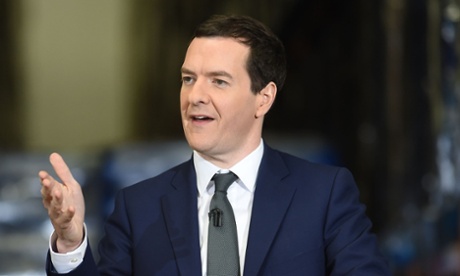
A post-election deal between Labour and the SNP would represent a “dangerous cocktail” that would lead to higher interest rates and a rise in unemployment, George Osborne has warned.
The chancellor, who admitted the general election result would be close, seized on the claims by a series of banks and pension investment funds that a deal between the SNP and Labour would be destabilising for the economy.
Osborne told the Today programme on BBC Radio 4: “On 8 May we can either get straight back to work with a clear plan that is delivering for our country or we face this deeply unstable Miliband-SNP government committed to much more borrowing. That leads to a dangerous cocktail which increasingly international investors say will lead to higher mortgage rates, higher taxes and lost jobs. We have got to avoid that outcome, having achieved so much in Britain over the last five years.”
The chancellor spoke out as Ed Miliband claimed that spending cuts planned by the Conservatives were bigger than those planned in any of the world’s 33 most advanced countries and would be deeper in the next three years than the last five.
The Labour claim comes before a briefing on Thursday by the Institute for Fiscal Studies on the main parties’ tax and spending plans and represents an attempt by the leadership to bring the campaign back to one of the central issues of Tory spending cuts.
The claim that the cuts proposed by the Conservatives are deeper than anything proposed in 33 other countries is drawn from an analysis by the International Monetary Fund, which has also recently praised the British government for its return to growth.
But Osborne sought to maintain the pressure on Labour over a possible deal with the SNP to install Miliband in No 10. Polls suggest the SNP could win all but a handful of Scotland’s 59 seats, handing the nationalists a decisive say in a hung parliament. Miliband has ruled out a coalition with the SNP and appeared to go further and rule out a less informal arrangement during an appearance on the Jeremy Vine show on BBC Radio 2 on Wednesday.
The chancellor insisted that Labour could not hope to win a parliamentary majority, indicating that it would have to rely on a “deeply unstable block in parliament of Scottish nationalists who will vote vote-by-vote, budget resolution by budget resolution”. Osborne claimed that the Canadian bank CIBC had warned of the dangers posed by a Labour-SNP deal. He said: “They [CIBC] say a Labour government supported by the SNP would lead to a dangerous cocktail where taxes are going up, spending is going up and interest rates are going up”. [see footnote]
Osborne said that similar warnings were issued by US investment bank Morgan Stanley, BlackRock, the largest pension fund in word, and Deutsche Bank.
The chancellor said: “These are pretty unsentimental people. These are economists and investors who make a living predicting what is going to happen to different economies round the world. And this week they have come out in a chorus to point out the consequences for the UK of departing from the economic plan that we have pursued.”
The Tories have faced criticism that their claims about a Labour-SNP deal are a sign of a relentlessly negative campaign. Osborne, who acknowledged that the election was “very close”, denied that the Tories were resorting to scare tactics.
Osborne said: “Of course we point out the risks of the alternative. But the vast bulk of our campaign is about promoting the positive ... Yesterday the prime minister was talking about the free childcare we are going to offer to families.”
Labour issued a briefing to challenge the Tories’ claims that they were offering a “good life” to the British public. Miliband said the prime minister’s claims that the worst of the cuts had already been made had already been shown to be untrue by the IFS, and the Tory plan for a second term would put key public services, including the NHS, at risk.
Labour claimed the Tories were planning cuts to public services of 3% of GDP until 2018, which is unprecedented in any three-year period for the UK since the postwar demobilisation.
The IFS researchers are due to present the implications of manifesto commitments for debt and borrowing, and for overall levels of tax and spending.
They have been deeply critical of all parties, suggesting the Tories have made a series of unfunded spending commitments and arguing Labour’s deficit reduction plans are so unclear that it is possible Labour could go through the next parliament without making any extra cuts beyond those being implemented in 2015-16. It is also likely to highlight the extent to which Labour may borrow for capital investment.
• This article was amended on 24 April 2015 to clarify remarks made by George Osborne on the Today programme about the Canadian bank CIBC. An earlier version suggested, as had the chancellor, that CIBC had said “a Labour government supported by the SNP would lead to a dangerous cocktail where taxes are going up, spending is going up and interest rates are going up”. We now understand that these words are not from a CIBC report and that Osborne was paraphrasing remarks by Jeremy Stretch, a currency strategist at CIBC, that were reported in the Sun on 17 April 2014.

